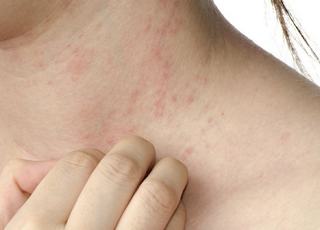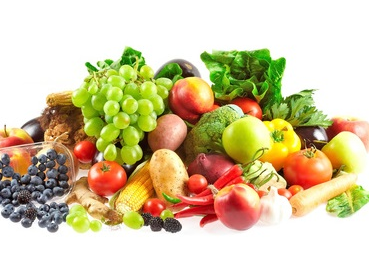Eczema and psoriasis are two conditions that are often confused for each
other, but are very different. Eczema, also known as dermatitis, is a group of
conditions in which the skin is hot, dry, itchy and scaly. In severe outbreaks,
the skin may become raw, red and bleed. Eczema is thought to be a reaction to
environmental irritants or allergies, and symptoms are worsened by stress and
hormonal fluctuations. Psoriasis is a different inflammatory skin condition. It
is marked by patches of raised reddish skin, covered with a whitish silver
layer. The most common form (plaque psoriasis) is common on the knees, elbows,
scalp and thelower back.
Eczema causes an intense itch. It can get so bad that you scratch enough to make your skin bleed.
If you have psoriasis, you also could be itchy, but there's something extra going on. Your skin may sting or burn. Some people say it feels like you're getting bitten by fire ants.
Eczema makes your skin red and inflamed. It may be scaly, oozing, or crusty. You may see rough, leathery patches that are sometimes dark. It can also cause swelling.
There are some things that are similar in the way psoriasis appears. You may have red patches. They may be silvery and scaly -- and raised up high. But if you look closely, the skin is thicker and more inflamed than eczema.
Eczema often appears on parts of your body that bend, like your inner elbow or behind your knees. You can have it on your neck, wrists, and ankles. Babies sometimes get it on their chin, cheeks, scalp, chest, back, arms, and legs.
Psoriasis often shows up on places like your:
Elbows
Knees
Scalp and face
Lower back
Palms of your hands
Soles of your feet
You may also have patches on other areas, such as:
Fingernails and toenails
Mouth and lips
Eyelids
Ears
Skin folds
Eczema and Psoriasis are easily confused because they share a defining characteristic, the inflammation of the skin. What are the significant differences between Psoriasis and Eczema?
Eczema sufferers experience extremely dry, itchy and flaky skin, but this skin condition can also cause eczema pimple-like bumps that may ooze. These fluid-filled bumps do not occur in Psoriasis. In fact, a major difference between psoriasis and eczema is that Psoriasis is never moist; instead, it produces scaly, silver patches of dead skin that continually shed.
Psoriasis is often linked to genetics; this condition is caused or exacerbated byinternal health issues (there is a link between Psoriasis and Diabetes, for example). Eczema, on the other hand, flares up in response to external factors, including animal dander, food allergies or exposure to harsh cleaning chemicals.
Eczema usually begins during childhood (roughly 80% of cases of eczema begin before the age of 5) whereas Psoriasis typically originates in adulthood.
Psoriasis prefers tougher skin (such as that on the knees and elbows) while Eczema favors sensitive areas like the backs of knees and the inside of elbows.
Eczema causes an intense itch. It can get so bad that you scratch enough to make your skin bleed.
If you have psoriasis, you also could be itchy, but there's something extra going on. Your skin may sting or burn. Some people say it feels like you're getting bitten by fire ants.
Eczema makes your skin red and inflamed. It may be scaly, oozing, or crusty. You may see rough, leathery patches that are sometimes dark. It can also cause swelling.
There are some things that are similar in the way psoriasis appears. You may have red patches. They may be silvery and scaly -- and raised up high. But if you look closely, the skin is thicker and more inflamed than eczema.
Eczema often appears on parts of your body that bend, like your inner elbow or behind your knees. You can have it on your neck, wrists, and ankles. Babies sometimes get it on their chin, cheeks, scalp, chest, back, arms, and legs.
Psoriasis often shows up on places like your:
Elbows
Knees
Scalp and face
Lower back
Palms of your hands
Soles of your feet
You may also have patches on other areas, such as:
Fingernails and toenails
Mouth and lips
Eyelids
Ears
Skin folds
Eczema and Psoriasis are easily confused because they share a defining characteristic, the inflammation of the skin. What are the significant differences between Psoriasis and Eczema?
Eczema sufferers experience extremely dry, itchy and flaky skin, but this skin condition can also cause eczema pimple-like bumps that may ooze. These fluid-filled bumps do not occur in Psoriasis. In fact, a major difference between psoriasis and eczema is that Psoriasis is never moist; instead, it produces scaly, silver patches of dead skin that continually shed.
Psoriasis is often linked to genetics; this condition is caused or exacerbated byinternal health issues (there is a link between Psoriasis and Diabetes, for example). Eczema, on the other hand, flares up in response to external factors, including animal dander, food allergies or exposure to harsh cleaning chemicals.
Eczema usually begins during childhood (roughly 80% of cases of eczema begin before the age of 5) whereas Psoriasis typically originates in adulthood.
Psoriasis prefers tougher skin (such as that on the knees and elbows) while Eczema favors sensitive areas like the backs of knees and the inside of elbows.


